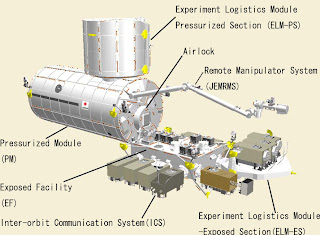
It's great to hear that the Japanese laboratory component of the International Space Station, "Kibo", is being successfully installed. I remember being most impressed when I learned about that module years ago at JSC. They have a full-sized lab (like the U.S. lab, "Destiny"), but also a separate storage shed and an external palette for experiments exposed to space, with a dedicated small robotic arm! Seeing the perennial space station news pop up on cnn, it got me thinking about manned space flight and its importance.
When I worked in Houston, the International Space Station was talked about with the sort of starry-eyed optimism that had drawn me to NASA and space exploration in the first place. Everyone at JSC was proud of their association with the manned spaceflight program, and this drove them to work hard to be able to contribute. Every little job was a real addition to the body of work that went into keeping the station and shuttle programs operating.
When I came to UCLA and got into space physics, I found that the feelings of most scientists toward manned spaceflight was very different. Most saw the current manned space program as a waste of resources. Tens of billions of dollars spent on the ISS over a decade now ($25.6 billion from 1994 - 2005 according to
NASA's site) and about $2 billion per year expected from now until 2017 when we are slated to stop funding ISS altogether. And that cost does not even include the budget for the Space Shuttle, even though the shuttle's primary mission has been constructing and servicing the ISS for a while now. For all that money and manpower, there have been very few significant scientific results to show for it. In contrast, NASA's unmanned space program, sending missions at usually a few hundred million dollars a pop, but rarely more than several billion over the lifetime of a mission. Missions like the Mars Exploration Rovers, learning amazing things about the surface conditions of Mars, Cassini-Huygens exploring Saturn, it's magnetosphere, and its moons, SOHO keeping a watchful eye on the Sun, Voyagers 1 and 2, which are still transmitting after nearly 30 years from beyond the termination shock of our solar system, and dozens of other Earth-orbitting and interplanetary spacecraft. Such unmanned explorations of the Earth, the Sun, the other planets, and the space in between delivered observations that have vastly contributed to our understanding of the larger environment in which we live, and at an annual cost much lower than the cost of the space shuttle and ISS programs. So many more scientific results, for a fraction of the cost. Seems like a no-brainer which program is more scientifically valuable: not the one where people continuously orbit the Earth only ~200 miles up.
Of course, there is likely some bias built into the criticisms of the manned space program, at least those coming from space scientists. Most space physicists are funded in some way by NASA, and so more money for manned spaceflight means less money available for useful scientific programs that don't involve astronauts. After Bush announced his new "Vision for Space Exploration" a few years ago, NASA went through a major re-structuring, and funds were shifted around, often away from science programs into manned spaceflight engineering and operations costs.
There is science being done on the space station, of course, though not as much as was originally envisioned. You can see a list of experiments that have been carried out on station ever since it first launched
here. But the big question, of course, is "is it worth it?".
I think it is, personally. If the space station were never built, would there be more money available for non-manned space missions? Maybe. But maybe not. Many people are really only interested in a space program if there are humans going up into it, and all of these people in the U.S. can vote. The members of congress who approve the President's budget know that. Without a manned component, I am not convinced that NASA would get nearly as much funding as it currently does. It's not as easy to excite the voting public with data from magnetometers and spectrometers as it is to talk to floating astronauts in space. As much as some scientists and engineers might not like to admit it, there are non-scientific benefits to having a manned space program.
Take Apollo, for instance. We actually got a lot of interesting scientific results from our trips to the moon. I just learned last week that the first thing deployed after Apollo 11 touched down was not the American flag, it was the
Solar Wind Composition Experiment, a sheet of special foil hanging from a pole, which collected ions flowing in the solar wind. It was of course returned to the Earth by the astronauts, giving scientists a better insight into the composition of the charged gas that exists in interplanetary space.
We still have ~80 lbs of moon rocks sitting in a lab at Johnson Space Center, from which cosmochemists often request samples for scientific research. (
. . . and some unscrupulous NASA Co-ops try to steal and sell.) Analysis of these samples gives us information about the age and composition of the Moon AND the Earth, and tells us more about the nature and origin of the solar system. The
"sub-satellites" deployed in lunar orbit by Apollo 15 and 16 yielded interesting observations of the gravitational and magnetic fields of the moon. The
lunar seismometers that were deployed provided interesting information about the interior structure of the Moon, and remain the only successful seismographic experiment conducted on the surface of any body other than Earth. The
Laser Retroreflector experiment is still used to this very day to montior the Earth-Moon distance, revealing interesting things about the interior structure of the Moon, the slow recession of the Moon away from the Earth, and the consistency of Newton's Universal law of Gravitation. These are just a few examples.
So, the scientific merit of the Apollo program is not really in question. And yet, would we have launched men to walk on the Moon for purely scientific reasons? Hard to say if we would have, but we certainly didn't. Apollo was really a cold-war program. A demonstration of U.S. technical prowess in the aftermath of Sputnik. If we could put people on the Moon, what level of accuracy might we obtain in launching nuclear missiles over the Iron Curtain? If any country was interested in militarizing space, the U.S. would not want to be left vulnerable. Without the Soviet Union as a looming menace, I'd bet that the Apollo program would not have happened.
And so we're left with this interesting viewpoint: Useful scientific results from a program with unscientific motivations. Science was just along for the ride. And yet how many young children were inspired to become scientists because of the purely political pictures of a human stepping onto another world for the first time? The same scientists who criticize manned spaceflight for its lack of efficiency in producing scientific results were likely inspired to go into space science by the idea of going into space themselves, seeing the Earth from afar.
And what about the scientific results that came from the Gemini and Mercury missions? These missions were necessary in developing the ability to put people in space and safely bring them back. What scientifically useful results in space science did these programs bring about? Virtually none. But the Apollo program would not have been possible without them. Today, as we look to the many successes (and the 50% failure rate) of sending robotic spacecraft to do science at Mars, we still dream of sending people there to explore on foot. I've heard it said that the amazing results obtained by the MER rovers could have been obtained much more quickly in situ if astronauts were walking on Mars instead. Do we WANT to send people to the Moon and other planets? My bet is that if you ask the citizens in this country, and many others, the overwhelming response would be yes. Sending people to Mars will likely require several years of interplanetary space travel, round trip. People are spending long stints on the ISS, and returning a larger and larger data set about the logistical requirements and biological side affects of keeping people in space for long periods of time. So, is the ISS not worth the cost, because it is not returning as much science as the unmanned spacecraft on the nature of the Sun, the Earth, the other planets, and interplanetary space, even though it is providing invaluable data and experience in human survivability in space and international cooperation?
And what about the space shuttle? It, too, has cost far more than was originally thought to maintain and launch. It turns out that having a re-usable manned spacecraft doesn't really save you that much money, because of all the maintanence required to keep it safe. But it, too, has contributed to our exploration and understanding of space. Take Hubble, for example. That orbitting telescope has been monumental in its opening our eyes to the distant reaches of our own solar system and the rest of the Universe. And yet, it was broken and myopic when it was first launched. But we have been able to fix and improve the telescope, extending it's life far longer than would have been possible otherwise, by sending humans up on the shuttle to service it.
Of course, my opinion should be obvious by now. Of course it is worth the cost. The ISS is teaching us how to deal with other countries in a huge project to do something that has never been done before, and requires more resources than any one nation is able to muster alone. This is invaluable experience that can be applied to future manned missions to the Moon, to Mars, to Near Earth Asteroids, or whatever we choose to do. The unmanned space program is far superior in terms of delivering broad scientific results, it's true. But that does not mean the manned program is useless. The two should work hand-in-hand when possible, and stick to what each is good at when practical. Both need to exist for our exploration and understanding of space to be useful. The investment in time, money, and sometimes even lives, is an investment in the future of humanity.


